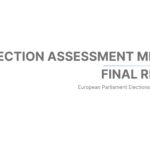
Election-Watch.EU inivted to speak on Data Protection Day
Brussels, 28 January 2022: The Data Protection Officer of the European Commission, Mr. Martin Kröger, invited Election-Watch.EU to address EU Member States’ data protection office representatives at the occasion of the Data Protection Day on 28 January 2022. In this high level online seminar with European Data Protection Supervisor Mr. Wojciech Wiewiórowski, representatives from DG JUST (Head of Unit Ms. Marie-Helene Boulanger), DG CNECT (Ms. Yordanka Ivanova) and of the Cabinet of the Commissioner for Justice Didier Rynders (Ms. Lucrezia Busa), Armin Rabitsch from Election-Watch.EU presented “Challenges to Democracy posed by Artificial Intelligence and use of personal data for the election process”.
Background
At the presentation of the legal framework on Artificial Intelligence, executive Vice-President for A Europe Fit for the Digital Age, Margrethe Vestager, said
“On Artificial Intelligence, trust is a must, not a nice to have. With these landmark rules, the EU is spearheading the development of new global norms to make sure AI can be trusted […].”
Commissioner for Internal Market, Thierry Breton, said
“[…] aim to strengthen Europe’s position as a global hub of excellence in AI from the lab to the market, ensure that AI in Europe respects our values and rules, and harness the potential of AI for industrial use”
On the Commission proposal concerning transparency and targeting of political advertising, Commissioner for Justice, Didier Reynders, said:
“[…] With the proposal on political advertising, we are securing the use of personal data in context of political targeting, protecting the democratic process. Together, we are making progress with our common work for democracy.
Programme:
Data Protection Officer of the European Commission, Mr. Martin Kröger, opened the meeting before Armin Rabitsch from Election-Watch.EU gave a practitioners input on “Challenges to Democracy posed by Artificial Intelligence and use of personal data for the election process”:
Artificial Intelligence used by social media networks to moderate content impacts voters’ access, reception, and communication of information. Four problems can be highlighted:
1) the regulatory frameworks are often not clear or outdated to monitor effectively election campaigning online;
2) the oversight bodies (if there are any) are most often understaffed and not well equipped to monitor campaigning on social media networks;
3) the social media networks lack transparency, accountability, accessibility and effective remedies for voters and oversight bodies;
4) the voluntary self regulation by social media networks is insufficient.
Armin Rabitsch also provided five key-recommendations:
1) To use Artificial Intelligence as an opportunity for better and more effective civic and voter education campaigns. AI could also help improve detecting malintended interference or non labeled political messaging;
2) To create standards of ethics about the use of AI and private data protection. Not only private companies but also public authorities need to comply with. Think of the opposition politician or human rights activist who is surveilled by his/her own government with AI spying software. This is a new trend developing in EU member states.
3) To ban microtargeting in political online campaigning. Let us keep in mind that an open society gains from political discussions and dialogue within society. Instead of creating silos and barriers between different platforms amplified by AI there is a need to stimulate political debate.
4) To conduct independent human rights impact assessments of social media networks and their AI driven programs. This oversight should include researchers and civil society to independently investigate possible biases in existing algorithmic content filters, and make research findings reproducible. Researchers need guaranteed and stable access to algorithms to verify whether microtargeting and online campaigning during elections is unbiased.
5) To introduce a policy regulation which imposes that algorithms are transparent. We need to prevent the creation of algorithmic “de-facto standards” that are developed by private entities, with no outside oversight, but with the power to decide what is acceptable content. Algorithm transparency is required in order to monitor how algorithms work together and change again and again.
Following Election-Watch.EU’s 30 minute presentation Ms. Yordanka Ivanova from DG CNECT presented a “Digital Strategy – State of Play, in particular on Artificial Intelligence” and on the Commission proposal on AI act and its implications for data protection rules and the need for human interventions.
Ms Marie-Helene BOULANGER, Head of Unit, DG JUST presented the “Proposal on transparency and targeting of political advertising” and the impact of the proposal on data protection rules, including GDPR and Regulation (EU).
Ms. Lucrezia BUSA, Member of Cabinet, Didier Reynders, talked about securing the use of personal data in context of political targeting and protecting the democratic process.
European Data Protection Supervisor Mr. Wojciech Wiewiórowski provided an “Overview and Outlook – on transparency and accountability concerning AI and political advertising”.
AI impact on freedom of expression, challenges to democracy by AI, challenges to elections by AI, data protection, data protection in elections
 Election Assessment Mission Report with good practice examples published
Election Assessment Mission Report with good practice examples published
 Webinar on European elections’ good practices and lessons learned
Webinar on European elections’ good practices and lessons learned
 Vote Advice Application for the Austrian general elections online
Vote Advice Application for the Austrian general elections online
 IFES Symposium on AI & Disinformation
IFES Symposium on AI & Disinformation